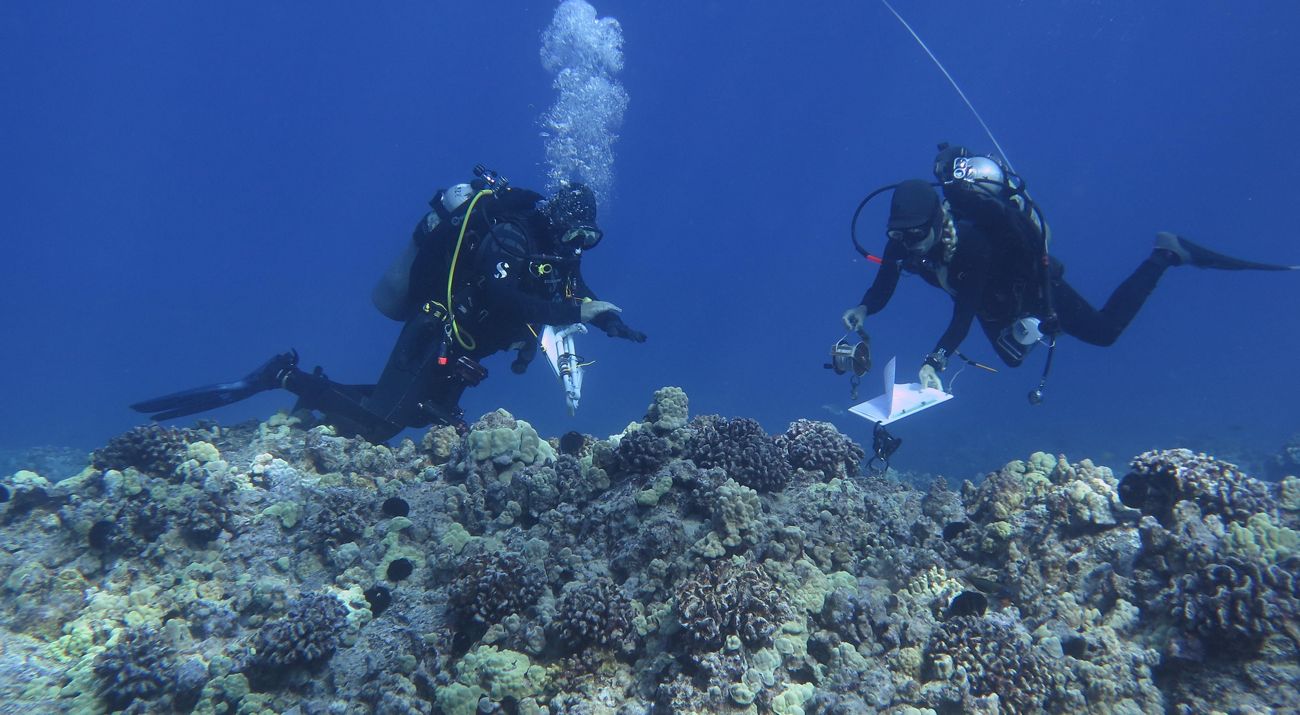Leading with Science-Based Strategies and Solutions
Increased understanding and better tools are vital to restoring Hawai'i’s once thriving reefs and fisheries.
TNC is building that understanding. Working in partnership with academic researchers, resource managers, community groups and fishers, we monitor coral reefs and reef fish populations and undertake research to assess:
- The extent and severity of coral bleaching and the potential for reefs to resist or recover from climate change impacts. See how reefs along the leeward coasts of Hawai'i Island and Maui fared.
- The impacts of land-based pollutants and sediment on coral reefs and water quality. View a 2-page summary to see how untreated wastewater impacts people and ocean life. Download our report to understand the challenges and potential interventions for reducing sediments at Olowalu and Ukumehame on Maui.
- The impacts of recreation and harvest on marine resources. A survey on Maui revealed 100% of common recreational activities resulted in reef strikes!
- Population changes and natural replenishment patterns of 'opihi, a local delicacy and staple of the traditional Hawaiian diet.
- The effectiveness of management actions to reduce threats and restore ecosystem health. See how fish populations are changing in the Ka'ūpūlehu Marine Reserve.
- Long-term trends in the conditions of nearshore coral reefs and fish populations. See highlights or download the Atlas of the Reefs of West Maui to find out how the reefs and fisheries have changed over the last 20 years.
This information helps State agencies and community groups understand changes in the health of nearshore reefs and fisheries over time, develop and implement management actions to enhance recovery, and measure change over time to inform adaptive management.
Our fish surveys also expand the State’s fish database compiled by the University of Hawai'i Fisheries Ecology Research Lab, allowing community, university and government partners to compare the health of nearshore fisheries at more than 50 sites across the state and helping assess how fishing is impacting Hawai'i's reefs. Listen to an interview to find out what else the study revealed.
TNC scientists also train community volunteers in the use of scientific monitoring protocols. The citizen scientists then put their newly acquired skills to use monitoring water quality and fish populations in their communities. The information they compile helps community groups and State agencies fill critical data gaps and develop and assess management strategies.
Together, we are improving our understanding of and ability to manage Hawai'i’s reefs and fisheries so they can support healthy, resilient communities long into the future.
Quote: David Chai
I haven’t personally seen a better approach than FishPath for fisheries management.
Pioneering New Strategies and Solutions
TNC is developing innovative tools to address the increasing pressures on marine environments and reef fisheries from the impacts of overharvest, land-based pollution and the climate crisis, including warming and rising seas and stronger and more frequent storms that can damage coral reefs and coastlines. To help Hawai‘i prepare for and address these challenges:
- We piloted FishPath, a participatory process to develop sustainable fisheries management plans based on local knowledge and insight from the latest available global fisheries science. That work catalyzed the creation of FishKit, a powerful suite of decision-support tools designed to allow stakeholders to interactively explore available fisheries data (such as life history and historical fishing effort and catch) to empower them to make informed decisions to enhance food security and reef health. These groundbreaking resources from TNC allow Hawai‘i communities to develop culturally appropriate and science-based guidelines to ensure sustainable harvest of food fish and are being shared with communities throughout the Pacific to support their fisheries management efforts.
- With the research we've done showing the relationship between land-based pollution, coastal waters and coral reefs, we co-led a Science for Nature and People Partnership (SNAPP) project integrating wastewater engineering and biodiversity conservation. The partnership published a new practitioner’s guide for integrating conservation and sanitation programs for the benefit of both people and ecosystems.
- We helped state partners develop a coral reef restoration plan for Hawai‘i and are working with community partners to implement reef restoration at priority sites to build coral reef and coastal resilience.
- We secured reef insurance to finance the restoration and repair of reefs after extreme weather events or natural disasters.
Your support makes all of our work possible. Thank you for choosing to invest—in us, in vital science and restoration, in strengthening local leadership and, most importantly, in creating a healthy and sustainable island home.



